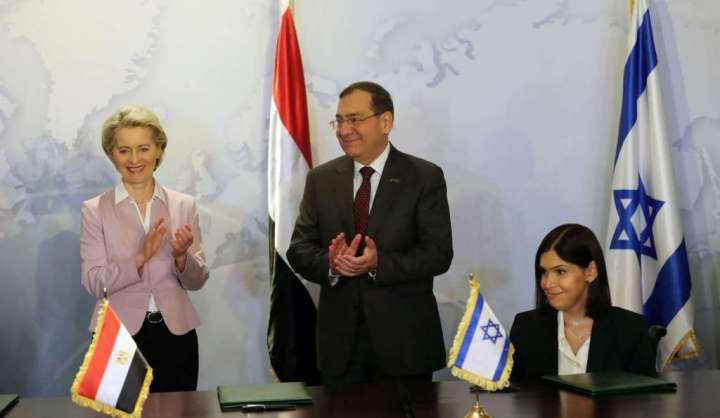TEL AVIV — Israel, Egypt and the European Union signed on Wednesday a trilateral natural gas deal in Cairo as Europe scrambles to cobble together an energy strategy to replace the Russian supplies it has relied on for decades.
Israel and Egypt sign gas export deal as Europe seeks Russia alternative

“This will contribute to our energy security. And we are building infrastructure fit for renewables — the energy of the future,” Ursula von der Leyen, the European Commission president, tweeted on Wednesday from Cairo with a photo of the signing.
Israel in recent weeks promised to accelerate its gas output as demand grows and prices soar. It is looking, in collaboration with other Middle Eastern countries, to sell to Europe, previously the largest client of Russian energy.
“With the beginning of this war and the attempt of Russia to blackmail us through energy, by deliberately cutting off the energy supplies, we decided to cut off and to get rid of the dependency on Russian fossil fuels, and to move away from Russia and diversify to trustworthy suppliers,” said von der Leyen in a joint news conference with Israeli Prime Minister Naftali Bennett in Jerusalem Tuesday night, at the end of a two-day visit to Israel and the West Bank. “It is an outstanding step bringing our energy cooperation to the next level.”
For Israel, it is an opportunity to get involved in a lucrative global energy market that has been soaring since the Russian war in Ukraine began in February.
“This is a tremendous moment in which little Israel becomes a significant player,” said Israeli Energy Minister Karin Elharrar in a statement on Wednesday.
Experts say that Israel’s supply will be nowhere near to Russian capacity. Israel produces more than 9 billion cubic meters of natural gas per year, though industry experts say there is at least double that amount in unexploited reserves. In 2021, the European Union imported 155 billion cubic meters of natural gas from Russia, accounting for around 45 percent of E.U. gas imports.
But Alex Coman, an energy expert from Tel Aviv University, said that Israel’s contribution becomes increasingly important as the Ukraine war thrusts Europe toward a more “fragmented strategy,” in which it will buy smaller amounts of energy from a number of different countries.
“Beyond just the war in Ukraine, Europe is so traumatized from Russian brutality” that it has moved toward a general restructuring of its energy system, “to avoid having dependence on one energy source,” he said.
In May, the London-based Energean company, announced that it had made a new commercial gas discovery of approximately 8 billion cubic meters off the coast of Israel.
But the complications of exploiting natural resources in a region long marred by conflict became apparent just weeks later, as Lebanon protested the arrival of one of Energean’s floating rigs and claimed that the gas fields in question lay within its own territorial waters. Lebanon is expected to drop the claim, according to officials who spoke with Reuters.
Wednesday’s export deal comes as the Nord Stream pipeline, the largest gas supply link to the E.U., cuts its output by 40 percent following repair delays, boosting already elevated natural gas prices by 15 percent.
The E.U. has worked with the United States and other allies to impose sanctions on Moscow, but several member countries remain heavily reliant on Russian oil and gas.






